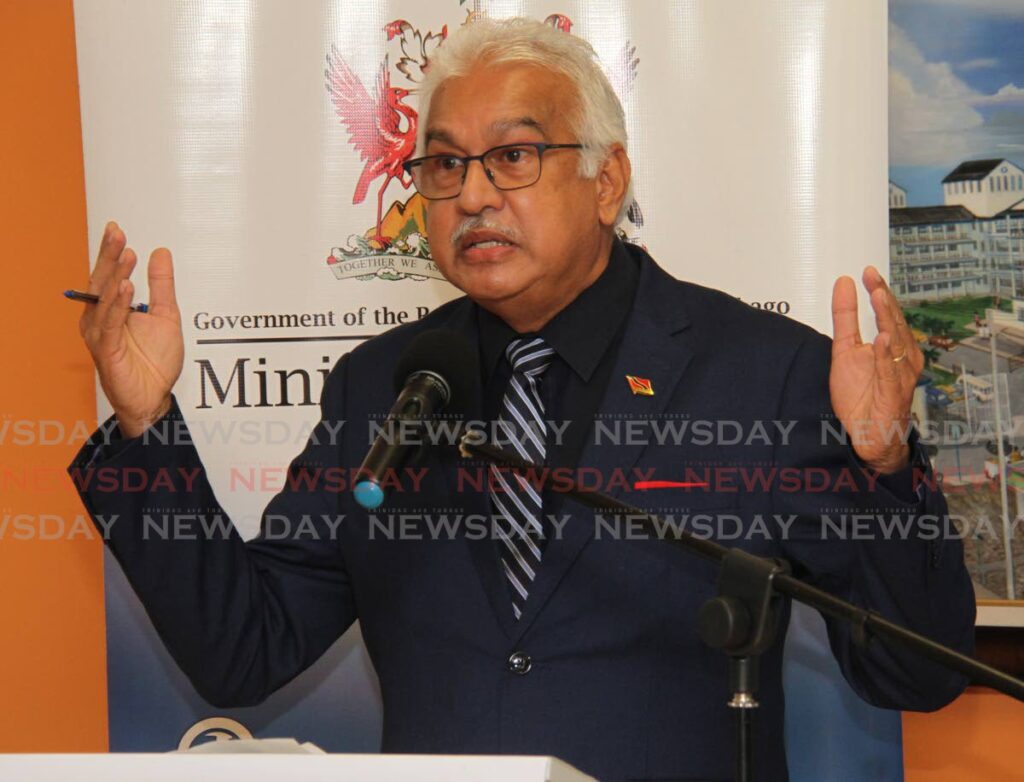Deyalsingh: Country prepared for monkeypox

Health Minister Terrence Deyalsingh has said while there are no cases of monkeypox in Trinidad and Tobago, the country’s health system is prepared in the event a case is imported.
He said the country has fulfilled the World Health Organisation's recommendations for countries which have not experienced a case of the virus.
Speaking at the ministry’s covid19 media conference on Wednesday, Deyalsingh said preparations began after a meeting with CARPHA, PAHO, and other stakeholders on May 20. He said this included bringing a note to Cabinet to have monkeypox listed as a dangerous infectious disease, bringing it under the Quarantine Act and the public health regulations.
Deyalsingh said TT falls into the WHO Group 1 of countries, that is, states/parties with no history of monkeypox in the human population or not having detected a case of monkeypox for over 21 days. He said there were nine action items which the WHO said should be carried out by these countries.
“These include activating or establishing health and multi-sectoral co-ordination mechanisms to strengthen all aspects of readiness for responding to monkeypox and stop human-to-human transmission; and interventions to avoid the stigmatisation and discrimination against any individual or population group that may be affected by monkeypox, with the goal of preventing further undetected transmission."
Other recommendations were establishing and intensifying epidemiological disease surveillance; intensifying the detection capacity by raising awareness and training health workers; raising awareness of monkeypox virus transmission, related prevention and protective measures, and symptoms and signs of monkeypox; and engaging key community-based groups, sexual health and civil society networks to increase the provision of reliable and factual information about monkeypox and its potential transmission.
Deyalsingh said the Caura Hosptial had been identified as the main site in Trinidad which would be used to house any monkeypox patients who needed hospitalisation, with a facility being set up in Tobago. He said there would be no mixing of covid19 and monkeypox patients in any facility.
He said while fever screening at ports of entry continues, there were no screening tests for monkeypox. There were no plans to issue travel restrictions at this time.
CMO Dr Roshan Parasram said as of Wednesday, there are 16,016 confirmed monkeypox cases in 75 countries, with the majority still in Europe and the US, and five deaths in Africa. Regionally, he said, Jamaica, the Bahamas, Venezuela, Martinique, and Barbados have all reported cases.
He said the disease is transmitted from person to person through close contact with infectious lesions, bodily fluids, respiratory droplets (from lesions in the mouth), and contaminated materials such as bedding. People can experience a wide spectrum of disease from mild to severe, with severe disease in populations such as young children, pregnant people, and those who are immunocompromised.
Sescribing the symptoms, he said: “Typical presentation of monkeypox would be in two phases, a febrile stage followed by a stage of skin eruption or rash. The febrile stage normally lasts one-three days, with fever, headache, swollen lymph nodes, muscle aches, back pain, and low energy.
"The skin eruption stage takes two-three weeks and the rash evolves over this time, beginning as lesions with a flat base and progressing to raised painful lesions to lesions with clear fluid (vesicles) to lesions filled with pus (pustules) to scabs and crusts. All lesions appear at the same stage of development.
“People remain infectious until all of the lesions have crusted over, scabs have fallen off, and a new layer of skin has formed underneath. The rash goes from vesicles to pustules to crusted-over, and it presents differently in different colours of skin. It presents like chickenpox in some instances and resembles smallpox as well.”
Parasram said in the current outbreak, the disease is not presenting as it normally does.
“Atypical cases have only a single or a few skin lesions appearing; the skin lesions appear before the fever, headaches, swollen lymph nodes, etc.; mouth sores; lesions appearing in the genital or perineal (groin)/perianal area without spreading farther; lesions appearing at different stages of development.
"The UK has reported cases of encephalitis (inflammation of the brain) and proctitis (inflammation of the lining of the rectum).”
He said protective/preventative measures include avoiding close physical contact with infected people or contaminated materials.
Parasram said the incubation period for the virus is five-21 days, with the recommended quarantine period being 21 days. Home self-isolation would be used, as the virus is a self-limiting one, meaning it tends to go away on its own, without treatment.
“Only if we have people coming straight into the country, for example picked up at a point of entry, in those cases we may look at isolation within one of the facilities to prevent spread, bringing that disease into the population or even into the household.
"Treatment is symptom-based, giving medication for the fever, making sure the person is hydrated, and hospitalisation if needed.”


Comments
"Deyalsingh: Country prepared for monkeypox"